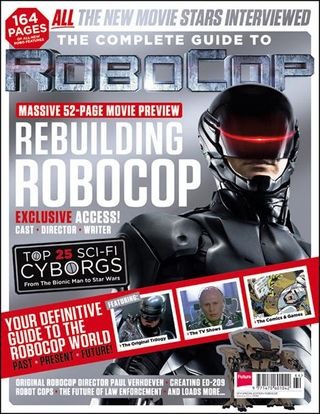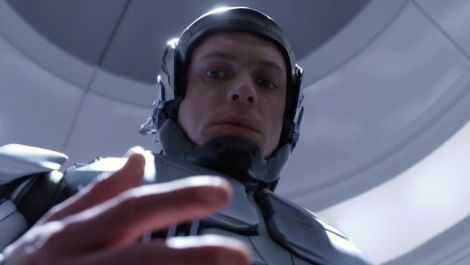With the amount of movie remakes that Hollywood greenlights nowadays, it seems even the half-decent ones are being drowned out by a never-ending torrent of misguided misfires. For every The Departed , there’s an Oldboy , a Wicker Man or a Total Recall . So it was no surprise that when a new take on RoboCop – Paul Verhoeven’s beloved 1987 sci-fi satire – was announced, fans raced onto the internet to voice their disapproval.
The griping carried on throughout the film’s delayed production. Script leaks suggested a more earnest story stuffed with socio-political allegories. Early pap shots hinted at a redesigned, unmasked robo-suit. And then there was the 12A rating which guaranteed a move away from the glorious ultra-violence of the original. All of which pointed to one thing: sacrilege!
Yep, it’s a tricky business remaking a classic. Stick too close to the source material and you render yourself redundant; veer too far away and you risk the wrath of hardcore fans. That most of the rumours are pretty much spot on means RoboCop v.2014 comes dangerously close to the latter. But while it may well irk some of the faithful, it might just win a few over, too.
Set in a not-too-distant 2028, director José Padilha’s reboot pitches a world where mega-multinational OmniCorp – fronted by ruthless CEO Raymond Sellars (Michael Keaton) – has become the US military’s major contractor. Over in the Middle East, its soldier drones and heavy artillery ED-209 units are helping to ‘enforce’ the peace; back home, its advanced robotics department is helping injured soldiers to walk again. But despite their best efforts, there’s one area of business they haven’t yet cracked – securing America’s own streets.
With US citizens unwilling to accept a police force made up of faceless robots, Sellars devises an audacious solution – fuse a real cop with an artificial body. Enter Alex Murphy (Joel Kinnaman), a principled young detective left mortally wounded after a brutal assassination attempt. He’s a prime candidate for the public to rally behind: a family man with a fierce commitment to justice.
But despite OmniCorp’s attempts to control their new ‘product’, Murphy isn’t quite ready to play the puppet – as Gary Oldman’s conflicted, Frankenstein-like creator warns: “Fear, instinct, compassion... will always interfere”.
Just like the original, the struggle between man and machine forms the backbone, though here the concept is upended. In place of Peter Weller’s detached cyborg, Kinnaman is painfully aware of what’s happened to him; in fact, it’s the dubious attempts of OmniCorp to suppress Murphy’s humanity that provides much of the story’s morally murky edge. This is also where the redesigned suit starts to make sense: Kinnaman’s frequently exposed visage requires the actor to do a lot more dramatic lifting – especially in the scenes involving Murphy’s wife (Abbie Cornish) and young son – making for a more easily relatable and sympathetic hero.
Don’t be too concerned that the titular metal man has gone all soppy on us, mind... When the visor does come down and he enters ‘Combat Mode’ (not as naff as it sounds), it’s time for business. As in Verhoeven’s film, the story really kicks into gear when Murphy ignores his programming and goes after his own killers.
And while this version does feel just a teensy bit toned down – with no melting men or machine-gun-mangled bodies in sight – Padilha at least captures the action with a frenetic, handheld ferocity reminiscent of his Elite Squad movies, as his streamlined enforcer guns his way through a series of intense set-piece shootouts.
And yet, even among all the big ideas, Padilha still finds room for a few lighter touches. not all of it works – Jay Baruchel’s smarmy marketing man grates, while some of the script’s more knowing one-liners (“if I had a pulse, it’d be racing...”) feel awkwardly out of place. More successful is Samuel L. Jackson’s network host Pat Novak – a biased supporter of mechanised crime control whose scenery-chewing, monologue-heavy propaganda interludes channel the cheeky spirit of the original.
Ultimately, Padilha’s update succeeds because it logically ports the core concept into a future that feels closer to our own. A few cutesy nods to Verhoeven’s film aside – the instantly hummable Basil Poledouris score excerpts, the thigh-ejecting gun holster – Padilha has successfully crafted a smart, thrilling sci-fi, different enough to exist on its own terms without ignoring or disrespecting its roots. Given the potential pitfalls inherent in reimagining a classic, you can’t say fairer than that.
Verdict:
Taking the original and successfully transplanting it into an ambitious new world, José Padilha’s english-language debut is an exciting, pacey and thoughtful sci-fi actioner .
Fan of the original and have a few questions for the director like... Is he sick to death of people prejudging his movie before they've even seen it? Was he worried about upsetting fans of the original? Why doesRoboCop have a human hand in the new movie? Did the studio force him to tone down the violence? Well he answers all those (and gave an exclusive commentary to the opening scenes of the original movie) below...

Buy the RoboCop special using MyFavouriteMagazines or iTunes .




